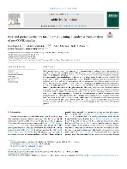Risk and protective factors for (internet) gaming disorder: A meta-analysis of pre-COVID studies

Autor
Martončik, Marcel
Babinčák, Peter
Baník, Gabriel
Vargová, Lenka
Adamkovič, Matúš
Datum vydání
2023Publikováno v
Addictive BehaviorsRočník / Číslo vydání
139 (Neuvedeno)ISBN / ISSN
ISSN: 0306-4603Metadata
Zobrazit celý záznamKolekce
Tato publikace má vydavatelskou verzi s DOI 10.1016/j.addbeh.2022.107590
Abstrakt
This large-scale meta-analysis aimed to provide the most comprehensive synthesis to date of the available evidence from the pre-COVID period on risk and protective factors for (internet) gaming disorder (as defined in the DSM-5 or ICD-11) across all studied populations. The risk/protective factors included demographic characteristics, psychological, psychopathological, social, and gaming-related factors. In total, we have included 1,586 effects from 253 different studies, summarizing data from 210,557 participants. Apart from estimating these predictive associations and relevant moderating effects, we implemented state-of-the-art adjustments for publication bias, psychometric artifacts, and other forms of bias arising from the publication process. Additionally, we carried out an in-depth assessment of the quality of underlying evidence by examining indications of selective reporting, statistical inconsistencies, the typical power of utilized study designs to detect theoretically relevant effects, and performed various sensitivity analyses. The available evidence suggests the existence of numerous moderately strong and highly heterogeneous risk factors (e.g., male gender, depression, impulsivity, anxiety, stress, gaming time, escape motivation, or excessive use of social networks) but only a few empirically robust protective factors (self-esteem, intelligence, life satisfaction, and education; all having markedly smaller effect sizes). We discuss the theoretical implications of our results for prominent theoretical models of gaming disorder and for the existing and future prevention strategies. The impact of various examined biasing factors on the available evidence seemed to be modest, yet we identified shortcomings in the measurement and reporting practices.
Klíčová slova
Gaming disorder, Internet gaming disorder, Video game, Gaming addiction, Risk factor, Protective factor,
Trvalý odkaz
https://hdl.handle.net/20.500.14178/2121Licence
Licence pro užití plného textu výsledku: Creative Commons Uveďte původ 4.0 International







